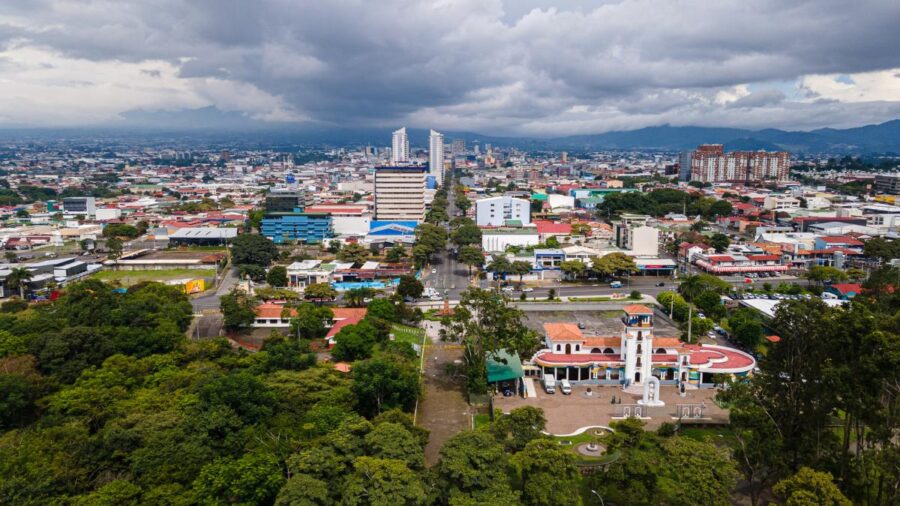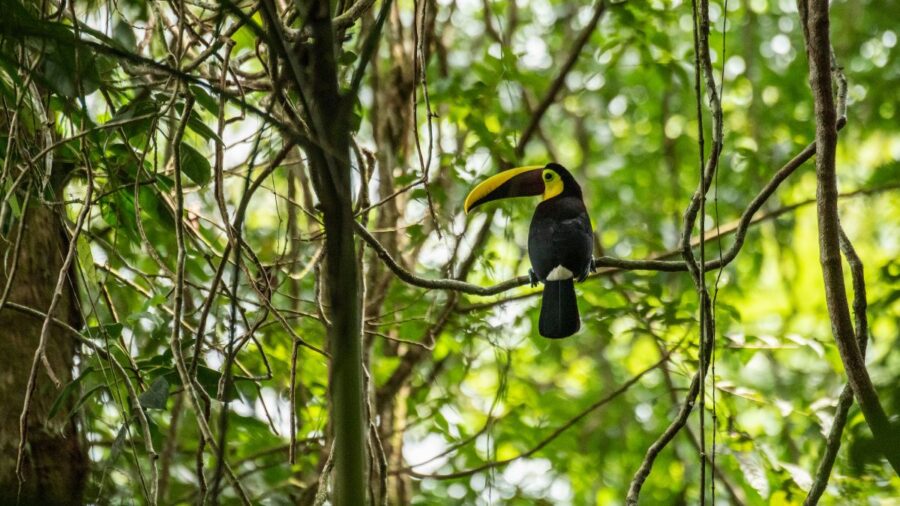
20
Eager to step into the footsteps of a college student who studied abroad in Costa Rica? We recently caught up with AIFS study abroad program participant and FEA Recipient Grant awardee Jolina. She’s a nursing student from California State University, Chico who spent her summer break studying abroad in the sunny city of San José.
Read on to learn more about Jolina’s study abroad experience with AIFS Abroad and the impact of being an international student in San José.
Why Study Abroad in San José?
Jolina was attracted to San José because of its lush natural landscapes, sustainability initiatives, and because Spanish is the official language of the country. Below, she explains that she chose to study abroad there so she could learn medical Spanish for her nursing career:
“I’ve worked at hospitals where there is limited access to translation services, and I’ve seen how language barriers pose significant challenges in healthcare. Patients may struggle to accurately describe their symptoms or understand their diagnosis and treatment. It is important to deliver equitable and culturally sensitive care to all patients, regardless of the language they speak. I came to Costa Rica with the intention of learning medical Spanish and improving my previous knowledge of Spanish.”
Language Learning
While there are many non-language learning program options that AIFS Abroad offers, some students, like Jolina, use their study abroad opportunity to learn a new language or build on their existing language skills. Jolina explains how studying in Costa Rica has helped her improve her medical Spanish:
“At Universidad Veritas, I took an intermediate Spanish class for healthcare professionals. In class, we covered vital signs, charting, symptoms, procedures, and recommendations. During these four weeks, my Spanish improved tremendously. Since there was only one other student in my class, one-on-one support was available whenever needed.”

Cultural Learning
One of the greatest benefits of studying abroad is having the opportunity to completely immerse yourself in a new culture and build a global perspective. Jolina describes how studying abroad opened her eyes to the “pura vida” lifestyle:
“Ticos (native Costa Ricans) prioritize the ‘pura vida’ lifestyle, meaning they live a ‘pure life.’ The ‘pura vida’ way of life focuses on finding balance and living modestly. It also entails strong connections with friends, family, and the community. In addition to the ‘pura vida’ mindset, Ticos follow a healthy diet, an active lifestyle, and stress-reduction practices. This was interesting to learn, and I adopted this cultural attitude while here. It’s amazing how the Ticos prioritize a balanced, positive mindset.”
Making Friends Abroad
Most people who go abroad worry about making friends at their study abroad destination, while others choose to study abroad with friends from home. It can be tempting to hold off applying until a friend is ready to go with you, but as Jolina explains, AIFS Abroad helps you make friends as soon as you arrive at your abroad destination:
“One of the most valuable aspects of the program was how it fostered a sense of inclusivity and community, especially during those first days when we were all adjusting to a new environment and still shy about meeting new people. AIFS made sure to create opportunities for everyone to bond right from the start, and this played a significant role in helping me connect with others and build lasting friendships. AIFS helped break the ice through a series of group activities that encouraged us to interact and get to know each other better. On the very first day, we all participated in a city tour of San José, which was not only a fun way to explore our new surroundings, but also an opportunity to share our personal backgrounds and stories. That initial shared experience of being in an unfamiliar place created a sense of camaraderie that set the tone for the rest of the trip.”
As you’ll hear from Jolina, all AIFS Abroad programs include group excursions, which are a great way to explore local landscapes while getting to know other program participants:
“The program also arranged regular group excursions, which were designed not only to immerse us in Costa Rican culture but also to encourage further bonding. Whether we were hiking through rainforests, visiting volcanoes, or relaxing on beautiful beaches, these group activities gave us all a chance to spend time together outside of the classroom, away from our normal routines. I remember how, over time, the group dynamic changed from initial awkwardness to easy, comfortable friendships. I began to feel like I was part of something bigger than just a study abroad program—it was as if we had all become a temporary family, navigating a new culture together. Today, we still stay in touch regularly, and I can genuinely say that we grew close by sharing meals, experiences, and studying abroad together.”
Growth Through Education Abroad
There’s no shortage of growth that happens when you study or intern abroad. Whether you choose to study abroad for a summer like Jolina or do a longer-term fall or spring semester program, you’ll see an immense change in yourself. Study abroad students like Jolina consistently report how studying abroad helped them with personal growth—many describing it as a transformative experience:
“Studying abroad with AIFS was an incredibly transformative experience, not just academically, but also personally… It pushed me out of my comfort zone in ways I hadn’t expected. I had no choice but to put myself out there, to step into social situations where I didn’t always know someone and wasn’t sure how I would fit in. This challenge became an opportunity for growth. I learned how to be more open and approachable, how to engage in conversations with people I might never have met otherwise, and how to be vulnerable in sharing my own thoughts and experiences. As a result, I not only made new friends but also grew in confidence and self-awareness.”

Traveling Sustainably in San José
Many Americans rely on a car to get around. Fortunately, study abroad students are often surprised how easy it to travel within their new city via public transportation options or finding that they can walk to most places. Jolina enjoyed how environmentally conscious Costa Rica was and how this was reflected in everything, including city planning and local transportation:
“The city itself was incredibly walkable, which made it easy to reduce my carbon footprint. My university was just a 15-minute walk away, and the closest grocery store was conveniently located around the corner, making it simple to live an eco-friendly lifestyle without the need for a car. I found myself walking everywhere, whether it was for errands, meals, or exploring the city, which not only helped me stay active but also aligned with the country’s emphasis on sustainability. When we did need to use transportation through the AIFS program, we made sure to prioritize sustainable options. For example, we used buses for our excursions, which helped minimize our environmental impact. Public transportation is a great way to reduce reliance on cars, and I appreciated how the program encouraged us to take part in this sustainable practice.”
Navigating Dietary Restrictions Abroad
Although trying local cuisine is seen as a benefit of studying abroad for many people, those who struggle with various dietary restrictions may be concerned about how their dietary health will be impacted if they decide to go abroad. Hear about how Jolina managed her gastroesophageal reflux disease (GERD) and lactose intolerance in San José:
“When I first started my study abroad program, I was a bit concerned about managing my dietary restrictions. However, my experience in Costa Rica quickly reassured me that my dietary needs would not interfere with my abroad experience. From the very beginning, my host mom was incredibly considerate of my lactose intolerance and made sure to accommodate my needs at every meal. Additionally, despite my GERD and frequent stomach aches back home, I found that the fresh, whole foods in Costa Rica were much gentler on my stomach. I didn’t experience the digestive issues I often faced in the U.S. In fact, my gut health was significantly better during my time abroad, as Costa Ricans prioritize healthy eating and preventative health practices. In the end, I learned that having dietary restrictions doesn’t have to limit your study abroad experience. In fact, it can open doors to new food experiences and encourage you to explore healthier, more mindful eating habits.”
Based on Jolina’s experience, dietary restrictions can be a reason, not a barrier, to study abroad!
Housing
AIFS Abroad offers a range of housing options at each of our study abroad destinations. Typical options can include shared apartments, student residences/dorms, and living with a local family in a homestay. Jolina chose to live in a homestay with two locals. She explains that (like many other study abroad students), she was worried about what it would be like and how she’d get along with her host family. Read about how Jolina’s host parents welcomed her into their home and helped Jolina immerse herself in the local culture:
“At first, I was nervous to stay with my host family. However, I knew that staying with a host family was the best way to [experience] Tico culture. My worries subsided as soon as I met my host parents, Marta and Fausto. Marta and Fausto have been host parents for over 30 years and immediately made me feel comfortable upon arrival. Every day, Marta prepared breakfast and dinner and sat down with me during meals to practice my Spanish. I sat with Fausto during fútbol matches and conversed about the culture in Costa Rica. Having a host family allowed me to fully immerse myself in Costa Rican culture. I enjoyed trying traditional Costa Rican dishes and learning about Tico culture from locals.”
In addition to her host parents, Jolina found all of the San José locals she encountered to be incredibly kind and welcoming:
“From the moment I set foot in San José, I felt welcomed by the warmth and friendliness of the locals.”

Day Trips and Activities
Every AIFS Abroad program includes social and cultural activities, as well as excursions. In addition to these AIFS-sponsored activities, you’re welcome to set out on your own, or with friends, and explore everything your destination abroad has to offer.
“In my free time, I explored outside of San José with my study abroad group. Some of my trips included the Monteverde Cloud Forest, Sarapiqui, and La Fortuna. I ziplined the longest zipline in Latin America, went white water rafting, and went on a night hike. At the Tortuguero and Manuel Antonio [national parks I saw] sloths, monkeys, and toucans up close. The combination of beautiful landscapes, wildlife, outdoor activities, and Tico hospitality elevated my experience in Costa Rica.”
Final Thoughts
Jolina sums her study abroad experience in San José with these final thoughts:
“Studying in Costa Rica not only improved my Spanish, but it helped change my perspective on holistic health and the importance of a positive mindset and well-being. With this experience, I hope to effectively communicate with Spanish-speaking patients, provide culturally sensitive care, and ultimately improve patient outcomes. I am eternally grateful for all of the donors that contribute to experiences abroad. Through this experience, I’m now able to further my nursing career and skillset and ultimately advocate for Spanish-speaking patients.”
Are you a student who’s ready to take the leap and study abroad like Jolina did in San José? We’d love to help you start your journey!
Here at AIFS Abroad, we know a thing or two about helping college students and pre-professionals study and intern abroad. Our programs are incredibly inclusive, which takes a lot of the stress out of planning. From coordinating your housing to providing things like cultural and social activities, excursions, comprehensive insurance, 24/7 emergency support, on-site staff, and more, you’ll take comfort in knowing you’ll have support throughout your entire experience abroad.